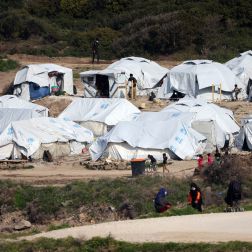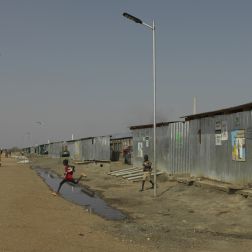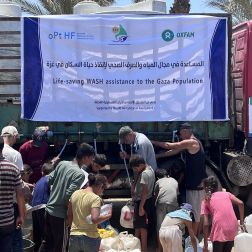- 3 mins read time
- Published: 25th February 2020
Rohingya crisis: Support Fashion Relief and make a difference
Cox's Bazar, Bangladesh
There's more to Fashion Relief than bagging a bargain or spotting your favourite celeb - it can make a real difference to families bearing the brunt of war and climate change.
Shoppers at Fashion Relief events will be supporting the world's most vulnerable communities - they include thousands of Rohingya people forced to flee Myanmar when conflict broke out in 2017. Around 700,000 people fled to neighbouring Bangladesh, settling in Cox's Bazar. With 1 million people now calling it home, it is the world's largest refugee camp.
Lorraine Keane recently visited Bangladesh to see Oxfam's work on the ground for herself. So far, we've distributed vital aid including clean water and food to 360,000 people in Cox's Bazar.
We’re helping people stay healthy by installing water points, toilets and showers, and distributing soap and other essentials. We’ve recruited more than 600 Rohingya volunteers to help us reach others with hygiene information, we’ve built the biggest-ever sewage plant in a refugee camp on site and our solar-powered water network delivers safe water to families.

We've also provided 25,000 refugee households with vouchers that can be exchanged at local markets for fresh vegetables and ingredients. We’ve hired over 1,800 Bangladeshi locals to work on construction projects including road repairs, schools and water sources and provided almost 400 people with grants to start or expand their small businesses.

To help women feel safer after dark, we’ve installed more than 350 solar-powered streetlights around the camp and provided 20,000 torches and portable solar lanterns. We’ve also worked with women refugees to design more secure toilets and supplied them with fabric and vouchers so they can make or order clothes they feel more comfortable wearing in public.

Sustainability in action
Fashion Relief is a key part of our work to increase sustainability across the fashion industry and support fair pay for garment workers. According to the UN, the textile industry generates more emissions than the aviation and shipping industries combined!
That's no surprise when 225,000 tonnes of clothes end up in landfill in Ireland each year. That's 225,000 tonnes of clothes not getting a second chance at life.
On top of that, cheap production and plummeting prices means the items we buy often end up in landfill before they should, while garment workers survive on low wages and more often than not experience poor working conditions [Source: Irish Tech News].
Join us on a journey to a more sustainable lifestyle, starting with the clothes you wear. We're proud to be a solution to "throwaway fashion" by reducing the amount of clothes and textiles that end up in landfill and giving pre-loved clothes a longer life. We also work with retailers, encouraging them to donate their end-of-line or excess stock to us instead of sending it to landfill. That's a more sustainable solution for people and planet!




